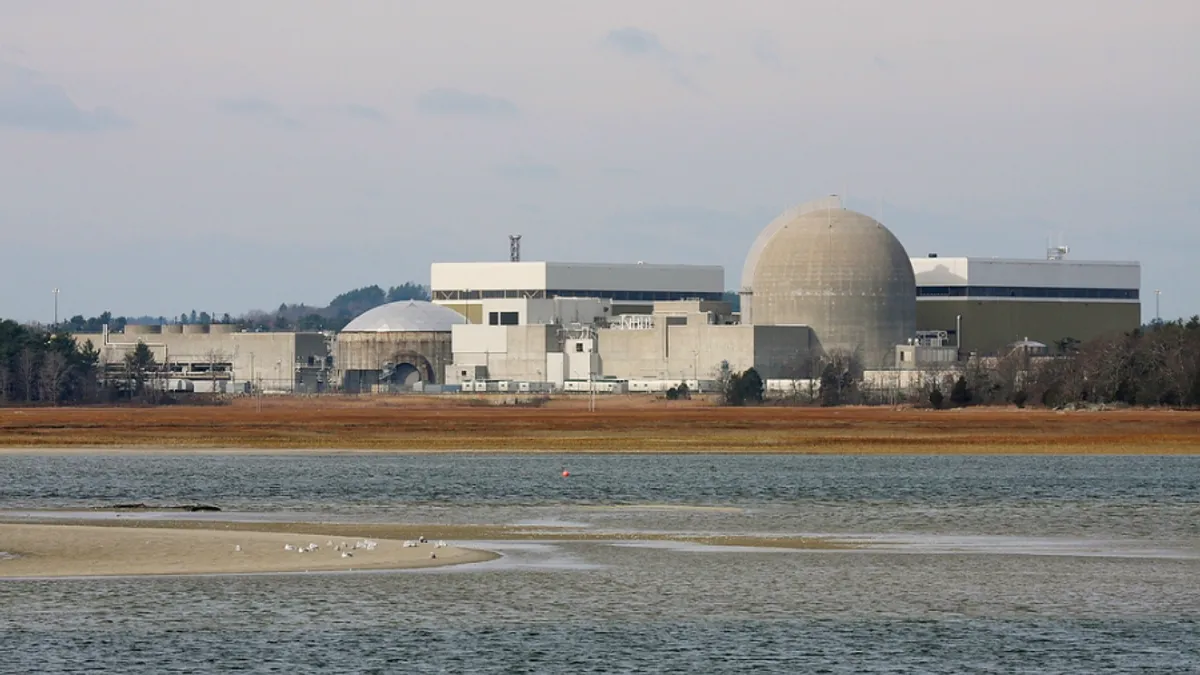Dive Brief:
-
To protect its revenue, NextEra Energy Resources is blocking the New England Clean Energy Connect (NECEC) line, a transmission project designed to import hydro power from Canada, by failing to agree to upgrade a circuit breaker at the Seabrook nuclear plant in New Hampshire, according to Avangrid and NECEC Transmission, the companies developing the power line.
-
NextEra has no obligation to make the upgrade at its 1,250-MW power plant, but is willing to do so if Avangrid agrees to adequate terms for the work, the Juno Beach, Fla.-based company said Friday in a filing at the Federal Energy Regulatory Commission, which is trying to resolve the dispute.
-
FERC's decision in the case has regional and national implications in the fight to cut greenhouse gas emissions, according to the Massachusetts Department of Energy Resources (DOER). "If NextEra and other generating-owning utilities are given the opportunity to delay and obstruct these projects, the communities that they serve, and the entire New England region's ratepayers, will suffer," the department said.
Dive Insight:
The issue centers on the $1 billion NECEC project, a proposed 145-mile power line in Maine that is designed to deliver 9.45 million MWh a year from Hydro-Québec to Massachusetts utilities. The 320-kV, direct current project grew out of a request for proposals by Massachusetts regulators to bring renewable energy to the state.
ISO New England (ISO-NE) determined that NextEra needs to upgrade a circuit breaker at its Seabrook nuclear plant to allow the NECEC line to safely interconnect to the grid. The Seabrook generating station is a "merchant" plant that gets all its revenue from sales in the ISO-NE markets.
Avangrid and its subsidiary NECEC Transmission a year ago filed a complaint at FERC arguing NextEra was slow-walking the upgrade project because the power from Canada will reduce NextEra's revenue in ISO-NE's power markets (EL21-6).
FERC last month decided it needed to hold hearings to help it resolve the complaint. FERC also opened a review of ISO-NE's rules for requiring grid upgrades to accommodate planned transmission facilities like the NECEC project (EL21-94).
Avangrid has agreed to pay for a new circuit breaker, but NextEra is refusing to do the work "under reasonable terms," Avangrid said Friday in a brief filed at FERC.
"There is evidence suggesting that NextEra has intentionally positioned its breaker to be a gating item for market entry," Avangrid said. "NextEra cannot and should not be allowed to block new market entry for its own financial benefit."
NextEra executives offered to reduce the company's opposition to the NECEC project if Avangrid agreed to buy power from the Seabrook plant at an above-market rate, Avangrid said. NextEra denied the allegation in its response to the complaint.
"If the commission were to determine that there is no obligation on NextEra to replace the breaker, then there would be no amount of money, time or unreasonable negotiating position that would prevent NextEra from continuing its effort to block the NECEC project's interconnection (and the interconnection of future market entrants)," Avangrid said.
NextEra, however, contends it has no obligation to upgrade the circuit breaker because it is part of its power plant, falling outside open access requirements for transmission facilities.
"Seabrook has not refused to replace the generation breaker; it has simply not agreed to incur a financial loss for NECEC's sole benefit," NextEra said.
NextEra said it isn't trying to block the NECEC project or other clean energy projects. NextEra has made a good faith effort to resolve contractual disagreements with NECEC, according to the company.
FERC's response to the dispute has "significant implications" for efforts across the United States to reduce carbon emissions, according to the Massachusetts DOER.
"The commission must act now to prevent an incumbent generator from unduly and unfairly leveraging its position to prevent market entry of new projects," the department said. "We urge the commission to act quickly and clearly articulate that a generator may not obstruct or unreasonably interfere with the interconnection, construction, or operation of an energy project."
The conflict threatens NECEC's planned 2023 in-service date, the DOER said.














